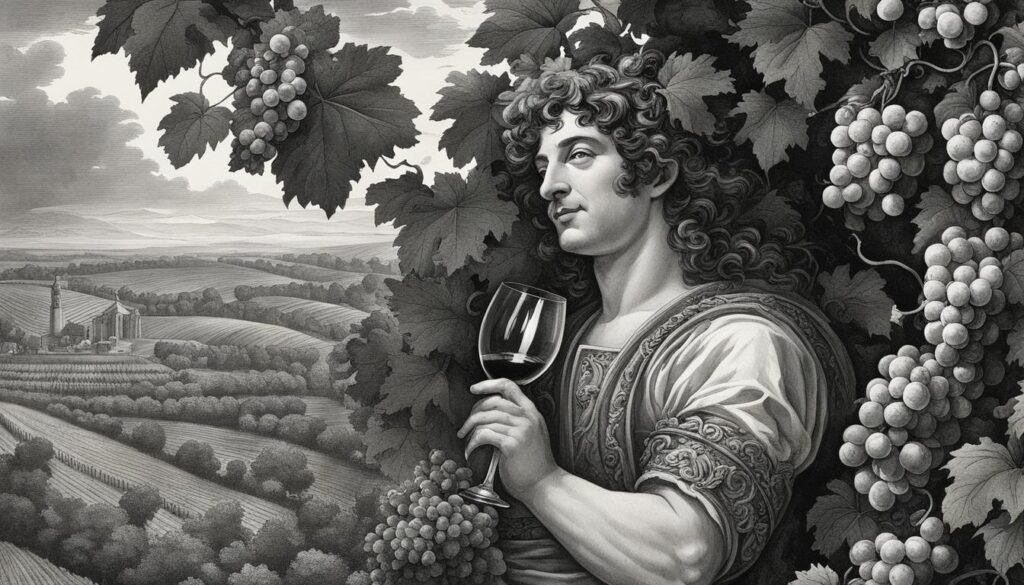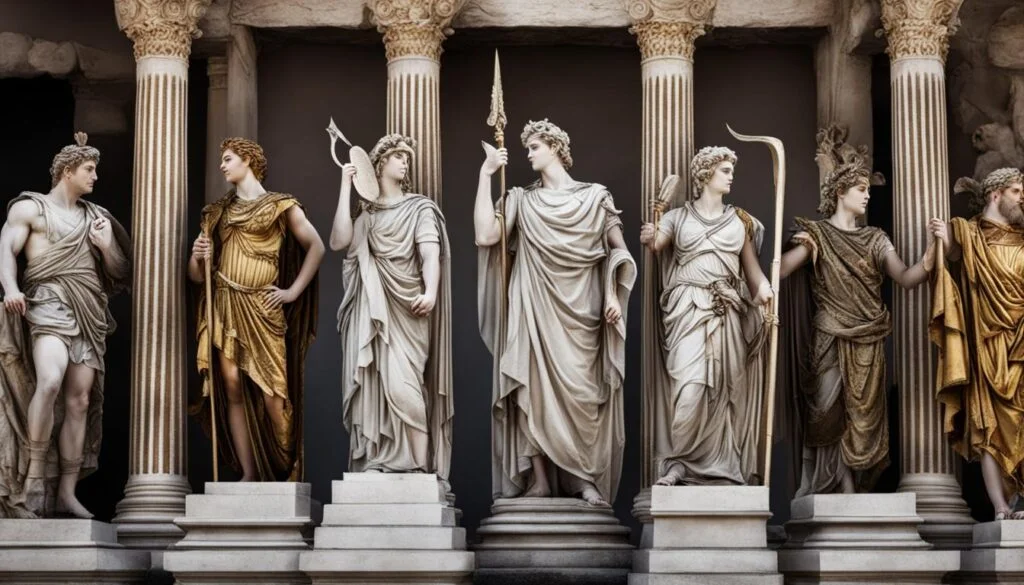Bacchus, also known as Dionysus in Greek mythology, holds a prominent place in ancient lore, symbolizing not only the pleasures of wine but also aspects of agriculture, fertility, drama, and revelry.
In this article, we dive into the captivating story of how Bacchus ascended to become the revered deity associated with viticulture and the intoxicating nectar of the gods. Let’s embark on this intriguing journey to uncover the roots of Bacchus’ divine reign.
Bacchus, also known as Dionysus in Greek mythology, is the Roman god of wine who symbolized not only the pleasures of wine but also aspects of agriculture, fertility, drama, and revelry. He was born to Jupiter and Princess Semele and became immortal after his mother’s death.
Key Takeaways:
- Bacchus, the Roman god of wine, emerged from the Greek mythology of Dionysus.
- He was born to Jupiter and Princess Semele, becoming immortal after his mother’s death.
- Bacchus traveled extensively, teaching people how to cultivate vines and enriching the world of viticulture.
- His wild celebrations, known as Bacchanalia, were characterized by dance, song, and excessive revelry.
- Bacchus’ legacy lives on through his influence in art, literature, and the enduring fascination with wine and celebration.
The Mythology of Bacchus
Bacchus, also known as Dionysus in Greek mythology, holds a significant place in the ancient pantheon.
Born as the son of Zeus, the king of gods, and the mortal princess Semele, Bacchus embarked on a journey that would make him an iconic figure.
Upon his mother’s untimely death, Bacchus was raised by nymphs on Mount Nysa, where he immersed himself in the secrets of wine-making and the mysteries of nature.
Bacchus’ influence extended far beyond his association with wine. In Greek mythology, he embodied the essence of fertility, vegetation, and the arts.
His worshippers, including the passionate Maenads and lively Satyrs, engaged in frenzied rituals and wild celebrations that highlighted Bacchus’ connection to ecstasy, freedom, and the creative spirit.
During the reign of the Roman Empire, Bacchus’ mythology captivated the hearts of the Romans.
The god’s cult spread like wildfire, symbolizing liberation, personal freedom, and the indulgence of the senses.
As Bacchus transcended various cultures and traditions, he left an indelible mark on the ancient world, becoming a deity revered not only for his association with wine but also for his embodiment of all that was joyous, spirited, and sensual.
Bacchus in Roman Mythology
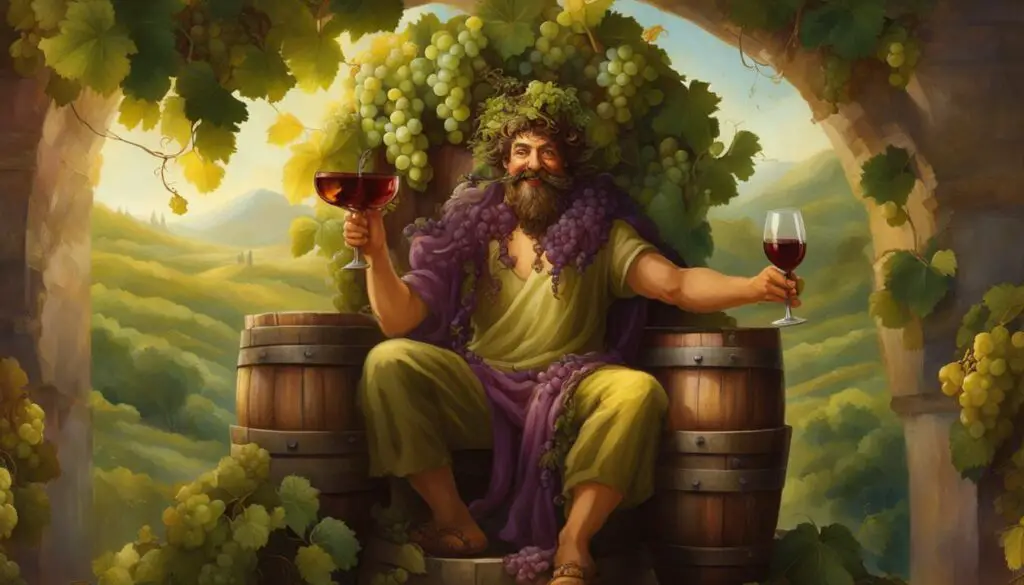
In Roman mythology, Bacchus was the revered god primarily associated with wine, agriculture, and fertility.
As the patron of the arts, Bacchus played a crucial role in the protection and promotion of theater in ancient Rome.
The festivals dedicated to Bacchus, known as Bacchanalia, were celebrated with immense enthusiasm and were characterized by excessive drinking, lively dancing, and exuberant revelry.
Bacchus’ close connection to viticulture was evident in his worship, emphasizing the profound bond between the god and the culture of winemaking.
His divine image was often portrayed with the thyrsus, a staff topped with a pinecone, symbolizing his authority over wine and the abundance it brought.
Bacchus was depicted wearing wreaths made of ivy or grape leaves, further signifying his association with the vine and its bountiful fruits.
To visualize Bacchus’ representation in Roman mythology, take a look at the following image:
Bacchanalia Festivals and Revelry
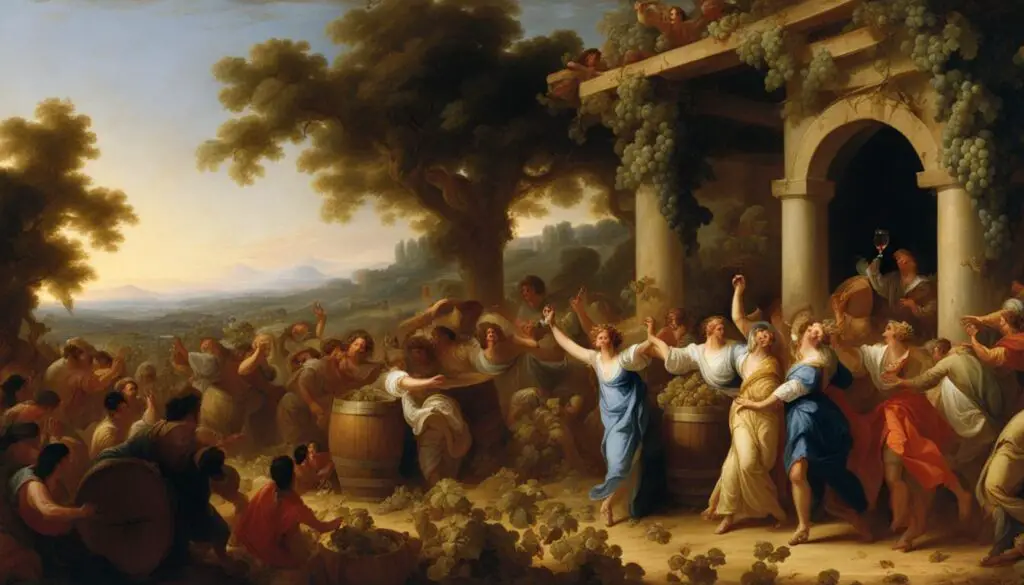
The Bacchanalia were raucous festivals in honor of Bacchus, the Roman god of wine, agriculture, and fertility.
These celebrations, initially held as private gatherings, eventually evolved into public city-wide events filled with debauchery and excessive drinking.
The Bacchanalia were renowned for their lively atmosphere, featuring dancing, singing, theatrical performances, and wild revelry.
These festivals served as a way for people to express their devotion to Bacchus and indulge in the pleasures associated with wine.
The intoxicating energy of the Bacchanalia mirrored the wild and ecstatic nature of the god himself.
However, the unbridled revelry of the Bacchanalia stirred concerns among Roman authorities.
The Roman Senate, alarmed by reports of moral corruption and political subversion associated with the festivals, took action to suppress them. In 186 BCE, the Senate issued a decree restricting the Bacchanalia and imposing severe penalties for participating in the unregulated cult rituals.
Despite the Senate’s efforts, the cult of Bacchus continued to flourish, extending its influence throughout the Roman Empire. Bacchus’ worship reached as far as Britain and North Africa, underscoring the lasting impact of the god and the enduring connection between Bacchus and wine.
In the center of the text, we have an image that represents the rich history of Bacchus and his association with wine.
The image showcases a vineyard, highlighting the viticulture and the deep connection between Bacchus and the cultivation of grapes for winemaking.
Bacchianalia Festivals: A Phenomenon of Excess
- The Bacchanalia included excessive drinking, symbolizing the transformative power of wine and its ability to unleash uninhibited emotions.
. - Dancing and singing were key elements of the Bacchanalia, with devotees engaging in ecstatic movements and vocal expressions of joy and liberation.
. - The festivals featured extravagant theatrical performances, depicting scenes from Bacchus’ mythology and showcasing the god’s impact on art and culture.
. - The Bacchanalia allowed individuals to temporarily escape societal norms, indulging in pleasure and self-expression within the context of the god’s worship.
The Bacchanalia, although suppressed, left an indelible mark on Roman society and beyond. The festivals tapped into the primal human desire for celebration, freedom, and spiritual connection, highlighting the enduring allure of Bacchus and his association with wine.
Bacchus in Art and Literature
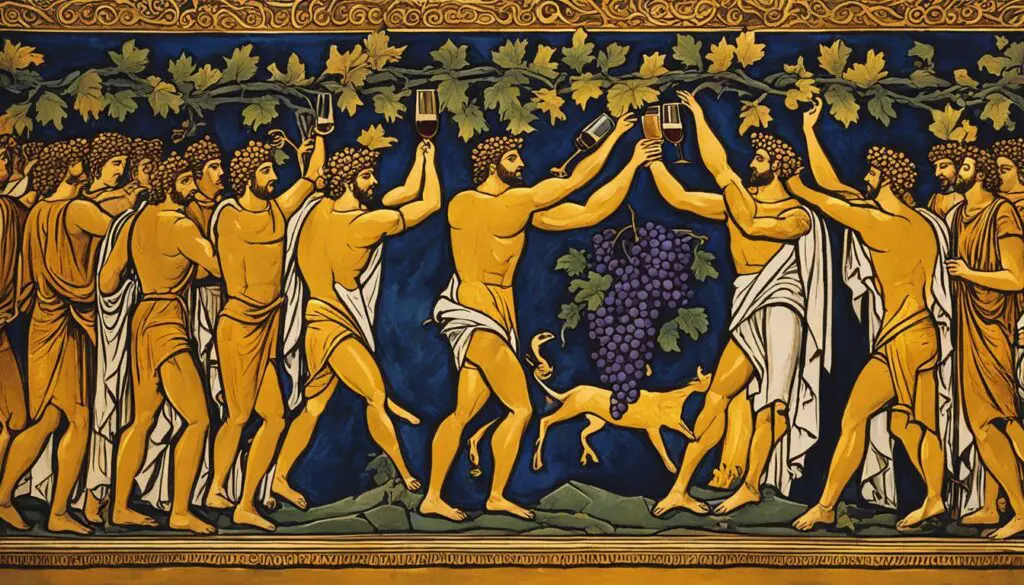
Bacchus, the Roman god of wine, has long been a captivating figure in art and literature. Through the centuries, renowned artists such as Caravaggio, Titian, and Rubens have created magnificent masterpieces portraying Bacchus and his devout followers.
These artistic representations of Bacchus have not only celebrated his divine presence but also served as an expression of the human fascination with the interplay between pleasure and liberation. From ancient sculptures and mosaics to Renaissance paintings and modern poetry, the myth and iconography of Bacchus have inspired countless creative endeavors.
Within these captivating works of art, Bacchus is often depicted holding his iconic thyrsus, a staff crowned with a pinecone, symbolizing his connection to nature and the transformative power of wine. Grapevines entwining his body, wreaths of ivy or grape leaves adorning his head, and the exuberant presence of his loyal followers—the Maenads and Satyrs—all contribute to the rich symbolism found in Bacchus’ portrayal.
The allure of Bacchus and his myth continues to captivate artists and writers to this day. From his depiction as a youthful and carefree god fostering joy and ecstasy, to the representation of his older and more profound persona, Bacchus has remained a recurring theme in artistic expression across cultures and generations. These visual and literary interpretations of Bacchus serve as a testament to the enduring power and timeless appeal of the god of wine.
Bacchus and Dionysus: A Comparison
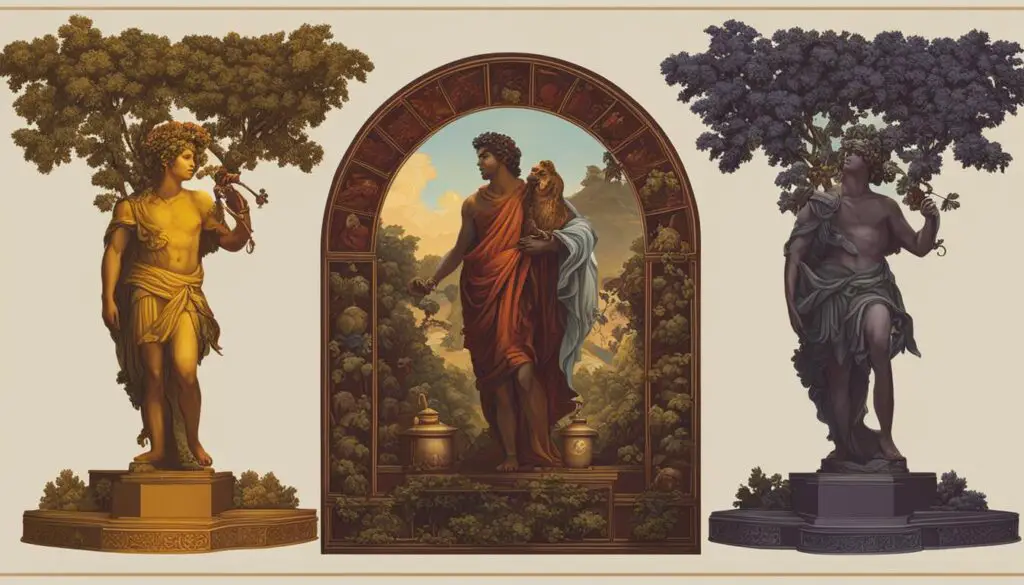
Bacchus and Dionysus, both revered as gods of wine, revelry, and fertility, are often considered to be the same deity with different names in Roman and Greek mythology, respectively. The connection between Bacchus and wine is deeply rooted in their mythologies, as they were both associated with the cultivation and enjoyment of the divine beverage.
With passionate followers and dedicated worshippers, Bacchus and Dionysus inspired wild and ecstatic celebrations. Their festivals were marked by revelry, dancing, and the consumption of copious amounts of wine. These boisterous gatherings were a testament to the gods’ connection to nature, liberation, and the arts.
Although their myths and rituals may have varied across civilizations, the essence of their divine nature remained the same. Bacchus and Dionysus, whether worshipped as the Roman god or the Greek god respectively, symbolize the power of wine to induce ecstasy, connection with the natural world, and the celebration of life.
To visualize the shared characteristics of Bacchus and Dionysus, imagine a scene of joyful revelry under the influence of wine. The vivid image of their followers, known as Maenads and Satyrs, dancing with abandon and celebrating the bountiful harvest is a testament to the enduring allure of these wine gods.
Key Similarities:
- Both Bacchus and Dionysus are gods of wine, revelry, and fertility.
- They are associated with wild and ecstatic celebrations.
- Nature, liberation, and the arts are integral to their worship.
- Bacchus and Dionysus have passionate followers who engage in lively festivals.
The stories and worship of Bacchus and Dionysus have left a profound impact on their respective cultures and traditions. Their connection to wine, nature, and celebration continues to inspire and captivate people to this day.
The Symbols of Bacchus
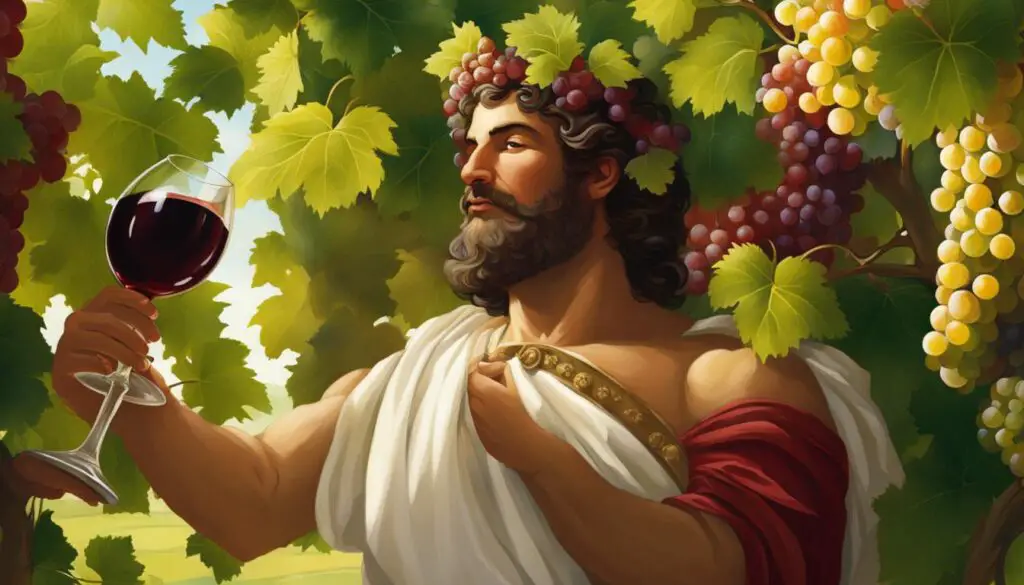
Bacchus, the wine god in Roman mythology, was associated with several symbols that held deep significance. These symbols represented his connection to nature, fertility, and the art of winemaking.
The Thyrsus: The thyrsus was a staff topped with a pinecone and wrapped in ivy or grapevines. It was a powerful symbol of Bacchus’ association with nature and the agricultural abundance that wine production relies upon.
Grapevines and Ivy: Bacchus’ dominion over the vine and wine production was symbolized by the presence of grapevines and ivy. These plants were often depicted in artwork and decorations associated with Bacchus, showcasing the importance of viticulture in his mythology.
Wreaths of Ivy or Grape Leaves: Bacchus himself was often portrayed wearing wreaths made of ivy or grape leaves. These wreaths served as a visual representation of his role as the god of wine and celebration, as well as a connection to fertility and abundance.
Maenads and Satyrs: Bacchus’ wild and ecstatic worship was further symbolized by his retinue of Maenads and Satyrs. Maenads were female followers who engaged in spirited revelry, while Satyrs were male companions known for their mischievous and sensual nature. These figures embodied the untamed energy and freedom associated with Bacchus’ festivals.
These symbols, intertwined with nature, fertility, and the joyous celebration of Bacchus’ worship, continue to reflect his enduring legacy and the powerful allure of wine.
The Spread of Bacchic Worship
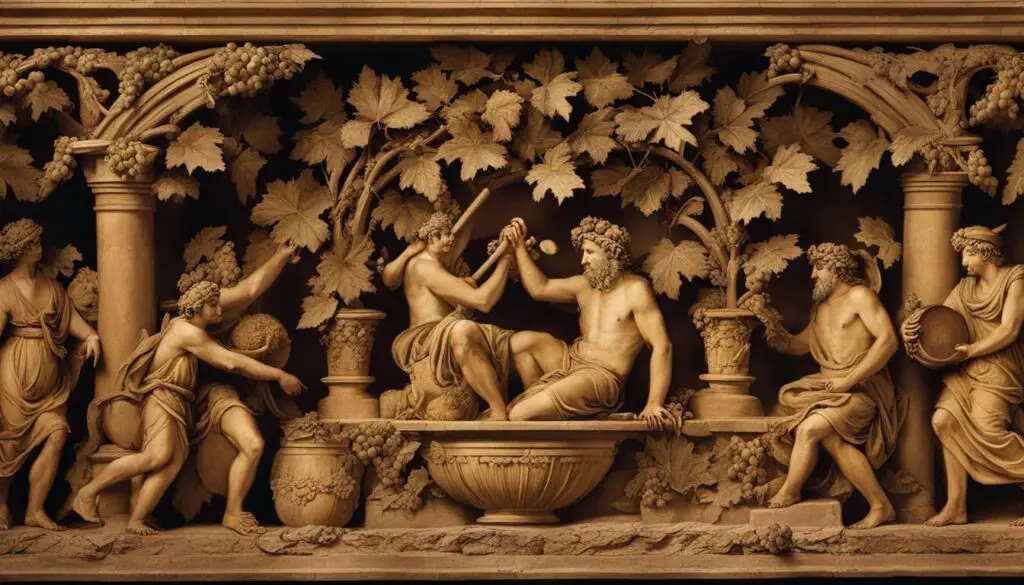
The worship of Bacchus, the Roman god of wine, agriculture, and fertility, transcended geographic boundaries and spread throughout the Roman Empire. His popularity can be attributed to his undeniable connection with wine, which held a significant place in the ancient Mediterranean world. Bacchus’ influence extended far and wide, reaching regions as diverse as Britain and North Africa.
What made Bacchus particularly captivating to the Roman citizens was his association with the festivals known as Bacchanalia. These lively celebrations offered a sense of liberation and personal freedom, allowing the worshippers to indulge in the pleasures of wine, dance, and revelry. Bacchus became a beacon of joy and euphoria, drawing people from all walks of life to partake in his divine festivities.
The cult of Bacchus permeated every aspect of Roman society. His image adorned temples and public spaces, and his rituals became deeply ingrained in daily life. Bacchic worship became a defining characteristic of the Roman identity, reflecting the importance of wine and its cultural significance.
Even today, Bacchus’ legacy endures. Wine continues to hold a special place in human culture, symbolizing celebration, refinement, and social connection. Bacchus, as the god of wine, has left an indelible mark on our collective consciousness, reminding us of the timeless allure and transformative power of this cherished beverage.
Bacchus: A Timeless Legacy
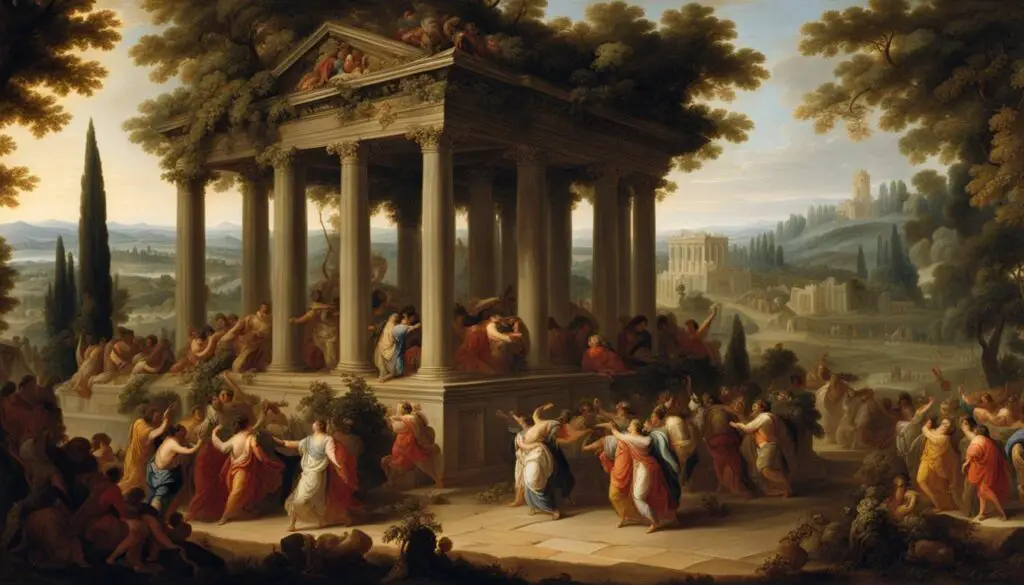
Throughout history, Bacchus has left a lasting legacy as the god of wine, fertility, and revelry. His mythology and iconography continue to inspire artists, writers, and scholars. The stories of Bacchus and his wild celebrations of Bacchanalia strike a chord with the unquenchable human desire for joy, liberation, and personal freedom. The name Bacchus remains synonymous with wine and the indulgence of the senses. His enduring fascination reveals the timeless appeal of the god of wine and his transformative power.
Conclusion
Bacchus, the Roman god of wine, agriculture, and fertility, has captivated people for centuries. Derived from the Greek god Dionysus, Bacchus embodies the joy, ecstasy, and transformative power associated with wine. His rich mythology and profound influence on art, literature, and culture have left an indelible mark throughout history.
The enduring allure of Bacchus lies in the celebration of wild revelry and personal liberation that he represents. From the ancient rituals of the Bacchanalia to the modern-day appreciation of wine, Bacchus continues to fascinate and inspire.
Exploring the enchanting tale of Bacchus allows us to delve into the intertwined history of viticulture, ancient traditions, and the mystique of the god of wine. It unveils the deeper connection between human experiences and the bountiful gifts of the vine. Bacchus remains a symbol of indulgence, pleasure, and the unquenchable human desire for joy.
Frequently Asked Questions
Q: Why is Bacchus the god of wine?
A: Bacchus, known as the Roman god of wine, symbolizes not only wine but also the intoxicating power of nature and its capability to dissolve the boundaries between the self and the other. He represents wine’s social and beneficial influences, as well as its capacity to bring forth a state of ecstasy and divine madness.
Q: What is Bacchus backstory?
A: Bacchus, also known as Dionysus in Greek mythology, is the son of Jupiter (Zeus in Greek) and Semele, a mortal. His birth is unique as he was born from Zeus’s thigh after his mother died, making him the only god with a mortal parent. His life was filled with adventures and he is often depicted as wandering the world, spreading the art of viticulture.
Q: How was the god of wine born?
A: The god of wine, Bacchus (Dionysus), was born from the thigh of Jupiter (Zeus) after his mother, Semele, a mortal woman, perished. Zeus rescued the unborn Dionysus by sewing him into his thigh, from which Dionysus later emerged.
Q: What does the Bacchus symbolize?
A: Bacchus symbolizes the dual nature of wine, representing both its capacity to bring joy, festivity, and release from the mundane, as well as its potential to induce a state of madness and chaos. He also embodies the idea of rebirth and regeneration, given his unique birth story.
Q: Why did the Romans worship Bacchus?
A: The Romans worshipped Bacchus as the god of wine, agriculture, and fertility, recognizing the vital role of wine in their culture and daily life. They celebrated Bacchus for the wine’s ability to liberate and inspire, as well as for its agricultural significance.
Q: Why is Bacchus called Dionysus?
A: Bacchus is called Dionysus in Greek mythology. The name change reflects the cultural transition from Greek to Roman society, where many Greek gods were assimilated into Roman culture with different names. Dionysus is the original Greek counterpart of the Roman god Bacchus.
Q: What is the difference between Bacchus and Dionysus?
A: Bacchus and Dionysus are essentially the same deity from different cultural perspectives. Bacchus is the Roman version, while Dionysus is the Greek version. While their basic attributes are similar, there are variations in their myths and worship practices reflecting the differences between Roman and Greek cultures.
Q: Did Bacchus wine have alcohol?
A: Yes, the wine associated with Bacchus, like all traditional wines, contained alcohol. The fermentation process of grapes, which produces wine, naturally results in alcohol, and this was well known and exploited in ancient times for religious and social purposes.


